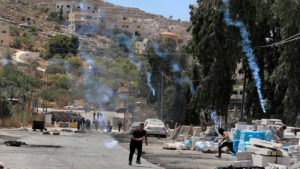RAMALLAH, West Bank — Muhammad Hamayel, a 15-year-old from the town of Beita, southeast of Nablus in the northern West Bank, was shot dead by the Israeli army during the clashes that took place in the town June 11, in protest against the outpost established on the lands of Jabal Sbeih in the town.
The town of Beita has turned into a heated confrontation point between the Palestinian residents and the Israeli army and settlers, in light of the latter’s attempt to establish a settlement outpost called Avitar atop Jabal Sbeih (Mount Sbeih).
Since the beginning of settlement activity at the top of the mountain May 3, the people of Beita have been engaged in daily confrontations that seem to escalate every Friday, with the participation of the residents of the two nearby towns of Yatma and Qablan, to counter the settlers’ takeover of the mountain. The confrontations have resulted in the death of four young men — Muhammad Hamayel; Issa Barham, a doctor from Beita who was killed May 14; Tariq Sanubar, a young man from Yatma killed May 16; and Zakaria Hamayel, a teacher from Beita killed May 28 — while hundreds of others were injured.
The settlers’ latest attempt to seize Jabal Sbeih came after a settler was killed at the Zaatara checkpoint in a shooting attack carried out by Mutassim al-Shalabi May 2.
Moussa Hamayel, deputy mayor of Beita, told Al-Monitor that the settlers had targeted Jabal Sbeih several times, but their recent attempt was the most dangerous, as within a few days they installed more than 40 mobile housing units on an area of 5 dunams (1 acre) out of a total area of 840 dunams (207 acres). They also paved the road on the top of the mountain, in a first step that allows them to later expand and control it.
He noted that Jabal Sbeih is a vital strategic location, as it overlooks the main road between the cities of Nablus and Ramallah, and runs adjacent to the road leading to Jericho and the Jordan Valley. In addition, it is only 1 kilometer (0.6 miles) from the Zaatara checkpoint, which is the most important military checkpoint for the Israeli army in the West Bank.
Hamayel explained that by taking over Jabal Sbeih, the checkpoint and the mountain will be connected to the eastern region of the West Bank (the Jordan Valley), thus turning the checkpoint into a large and only gateway to the northern West Bank, separating it completely from the central and southern West Bank.
Due to its location, Jabal Sbeih was subjected in past years to several attempts to seize it and establish a settlement outpost on its top, but the residents confronted these attempts every time and forced the settlers to leave. The first try was in 2013 after a stabbing attack at the Zaatara checkpoint in which a settler, named Avitar, was killed. Settlers established the outpost bearing the same name. However, after residents stood their ground and organized popular marches, the army had to dismantle the outpost.
In 2018, the settlers tried once again to establish an outpost after the killing of a rabbi near the settlement of Ariel north of Salfit. They installed mobile homes and supplied them with electricity and water, but the residents confronted them, which prompted the army to dismantle the outpost again.
The third attempt was in 2020 when settlers tried to establish three outposts on Jabal Sbeih, Jabal al-Arma and Jabal al-Najma in the town of Beita, but failed. The most recent attempt was in May and the residents seem to have succeeded this time as well in confronting the settlers.

